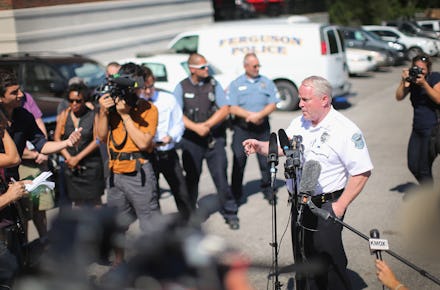The DOJ Just Released Its Ferguson Investigation — And What They Found Is Horrifying

The Department of Justice on Wednesday released its long-anticipated civil rights investigation into the Ferguson Police Department, revealing a pattern of racial bias and targeted abuse of the Missouri city's minority population. The report arrives seven months after an unarmed black teen, Michael Brown, was shot and killed on a Ferguson street by a white officer, setting off months of protests.
The DOJ's Civil Rights Division, which began its investigation shortly after Brown's death in August 2014, will not bring charges against Darren Wilson, the officer who shot Brown and later resigned from the force. But their probe of the police department's behavior could lead to a federal lawsuit against the city.
The investigation included "hundreds of in-person and telephone interviews as well as participation in community meetings," a "review of over 35,000 pages of police records" and a detailed "analysis of the [Ferguson Police Department's] data on stops, searches and arrests, as well as data collected by the municipal court," according to the final report.
Investigators found that black residents of Ferguson were subjected to 93% of arrests and 85% of traffic stops between 2012 and 2014, despite making up just 67% of Ferguson's total population. They were also "more than twice as likely as white drivers to be searched during vehicle stops, but 26% less likely to be found in possession of contraband, from 2012 to 2014," according to the report.
But that's just the start. Here are the 18 ugliest details from the probe into the Ferguson Police Department:
1. Officers sent racist internal emails about President Barack Obama, Michelle Obama and a pregnant black woman.
2. Fourteen people were recently bitten by Ferguson police dogs. All victims were black, and one was just 14 years old.
3. Seven officers beat and arrested a black teen for "trespassing" on his girlfriend's property. He had been invited over.
4. The city was dependent on cash from petty fines for a large part of its revenue. It used the police department as a kind of collection agency.
5. One officer pointed a gun at a black man sitting quietly in a car, then charged him for saying his name was "Mike" instead of "Michael."
6. A police officer harassed a minister, accusing him of being a thief. The officer faced no consequences.
7. An officer randomly demanded a black man at a bus stop hand over his ID so the officer could run a background check and search for outstanding warrants.
8. Officers routinely arrested people without probable cause. Five young black men were held because an officer "smelled marijuana." After a search, he found none.
9. Police tackled and arrested a man outside a police station because they mistook him for another man who was wanted by the state.
10. Ferguson officers repeatedly violated First Amendment rights in arresting people for "talking back" or "lawfully protesting perceived injustice."
11. Ferguson officers routinely verbally harassed black residents and faced no repercussions.
12. Officers arrested a man for helping his girlfriend who had just been in a car accident.
13. Another Ferguson officer arrested a black couple who allowed their young children to urinate in a bush, then deleted video of the ensuing argument off their mother's phone.
14. Ferguson officials routinely made tickets and citations "disappear" for friends and relatives.
15. For everyone else, there was little mercy. Ferguson courts routinely gouged citizens with fees attached to tickets and summonses.
16. Mentally and physically ill citizens were subject to violent force before and during arrests by Ferguson officers.
17. Ferguson officers routinely handed out speeding tickets without writing the alleged speed of the car on the citation.
18. Ferguson courts levied outrageous fines for the most minor offenses, with little explanation why.
What comes next? If the Justice Department and Ferguson officials follow the model set in Albuquerque, New Mexico, they will begin discussing plans to take apart and rebuild the police department. Failure to strike a deal on that front would lead the DOJ to pursue formal legal action against the city government.
Mic's Zak Cheney-Rice reported from Ferguson in October 2014 and spoke with activist Tory Russell about the politics of the region. "We want to work with elected officials, but that hasn't really happened yet," Russell said in the fall. "It's very important ... but either the system can be fixed, or it can't because it's working exactly the way it was designed to."
The DOJ's findings provide a unique, legal vindication for Russell and the thousands of demonstrators who marched in Ferguson and around the country in the aftermath of Brown's killing. Whether the "system can be fixed" or not will be a question for federal government, local officials and the citizens of Ferguson, who must now work together to undo and reverse a deeply rooted culture of corruption and systemic racism.